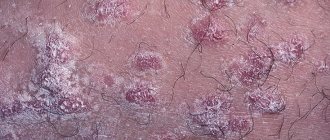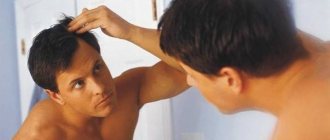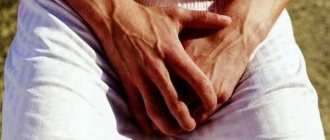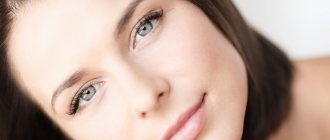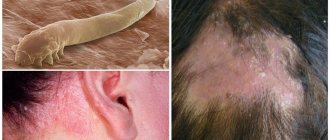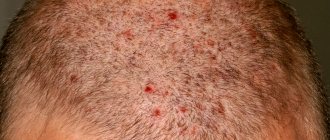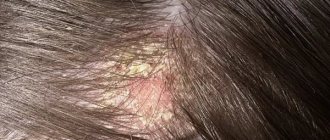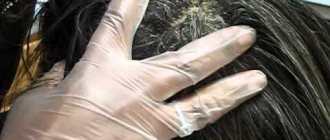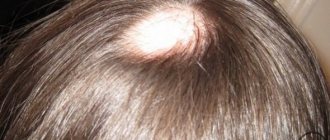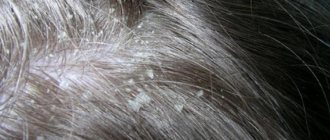Why does the scalp itchy and flaky?
There are many reasons for this unpleasant phenomenon. But all of them can be divided into two large groups: external and internal.
External causes of itchy skin:
- Allergy . Anything can be the cause of an allergy. It can be for shampoo or conditioner, hair dye, detergents, and even laundry detergent used for washing clothes and bed linen. If the unpleasant phenomenon is caused precisely by an allergy, then to eliminate it it is enough to detect and exclude the allergen;
- Incorrect, or rather, inadequate care . Irregular washing of the hair, shampoos selected inappropriately for the type of hair and skin, or, conversely, too frequent washing, often lead to unpleasant sensations;
- Moral exhaustion, lack of sleep , stress and overwork also cannot but affect the condition of the scalp.
These symptoms are easy to detect and eliminate. Therefore, if the scalp itches and flakes, but there is nothing to do with the sores, then it’s worth making a little effort and the situation will change.
If the problem is hidden inside, then it will take much more time and money to solve it.
Internal reasons:
- Lack of vitamins and nutrients;
- Fungus . The appearance of fungus is always associated with unpleasant sensations. Itching and peeling are its main symptoms;
- Diseases . Sores can cause a phenomenon where the scalp itches and flakes. Moreover, the variety of diseases is quite impressive. Lichen of many types, eczema, seborrheic dermatitis and psoriasis - all of them have itching and scaly formation in the list of symptoms;
- Parasites can damage the upper layer of the epidermis, causing itching and flaking. Among the inhabitants of the scalp, two groups are distinguished: pediculosis and demodicosis. Pediculosis is a more common occurrence and is an infestation of lice. The presence of mites is demodicosis;
- Increased skin dryness . The problem may be caused by a lack of vitamins. In addition, dryness occurs with excessive exposure to ultraviolet radiation.
Don't miss one of the most useful articles about: Nagging pain in the lower abdomen in women - causes
Why does your head itch if there are no lice - the most common causes
The appearance of unbearable, painful itching forces people to wonder why their heads itch - there are no lice, and their hair has been painstakingly washed not long ago. The causes of skin irritation can be both external and internal triggers. It is often impossible to identify them without the help of others, so you should resort to the help of doctors of a narrow specialization - a trichologist, dermatologist, gastroenterologist, endocrinologist.
They will conduct a series of laboratory tests and prescribe pharmacological drugs to eliminate the main cause of the diagnosed pathology, as well as to quickly relieve symptoms.
What signs should you be wary of?
Often, problems associated with symptoms where the scalp itches and flakes can be caused by sores. Sometimes this occurs due to the action of a certain factor, after detection and removal of which all problems disappear.
For example, if itching and flaking appeared in response to inappropriate hygiene products, it is enough to eliminate their use, and the unpleasant symptoms will go away. But there are situations when signals cannot be ignored.
If itching and peeling appear in response to inappropriate hygiene products, it is enough to avoid their use and everything will go away.
Carefully! If at least one of the following symptoms is detected, treatment should not be delayed under any circumstances. Severe itching, hair loss, peeling, the appearance of ulcers on the scalp - the presence of at least one of these signs obliges you to immediately seek help from a cosmetologist, trichologist or dermatologist.
Don't delay treatment. After all, these manifestations may indicate the presence of various serious diseases.
note
To prevent red spots on the back of the head in an adult, preventive measures should be followed. Each fungal infection, regardless of its location on the head or in any other area, can pass from a sick person to a healthy person. This means that contact with an infected person itself is fraught with infection for the people around him, because of this you need to be very careful.
If you see such manifestations in yourself, red spots on the back of your head and itching, you need to be careful so that you do not become a source of infection. It is best to inform your family about the disease, make sure that they do not use the personal hygiene products that you use, and begin treatment.
Causes of scabs
Scabs are a very common and unpleasant phenomenon. It is caused by an infectious skin lesion. The main symptom of scabs is severe itching of the scalp. Unpleasant sensations usually intensify in the evening, closer to night. Moreover, the itching does not appear on the surface, but intradermally. A further scenario for the development of the disease manifests itself in the appearance of a rash.
The main cause of the disease is contact with human skin by scabies , a special type of mite that often parasitizes the human body.
You can become infected with itching after contact of the skin of a healthy person with a sick person or his household items.
The course of the disease itself is quite long-term, since after the tick has penetrated the skin, a latent period begins. It lasts for a whole month. During this time, inside an unsuspecting person, the scab pathogen actively multiplies and infects the integument of the infected person.
The disease can be noticed only after the appearance of an allergic reaction to the waste products of the tick.
Young children and people with diseases associated with immunodeficiency are at particular risk. To treat scabs, external preparations in the form of ointments, creams, and tinctures are mainly used .
It is important that the applied reagents remain on the affected area for at least 12 hours. In addition to external medications, symptomatic treatment is acceptable to alleviate the patient's condition.
Persons who are in contact with an infected person must undergo a preventive course of taking acaricidal drugs. And the patient himself must comply with quarantine.
Read the new article in the section: Gallstone disease: treatment without surgery and diet
What drugs are used?
Therapy depends, first of all, on the causative agent of the disease, since removing its symptoms will not be enough. You definitely need to be examined by a dermatologist and undergo tests if necessary.
For red spots, which are considered the result of an allergic reaction, treatment, as a rule, comes down to the prescription of antihistamines (Suprastin, Tavegil, Loratadine, Parlazin), and in severe cases, systemic hormones. An essential role is played by detecting the allergen in order to stop contact with it in the future. Judging by the reviews, these drugs quickly remove allergic rashes on the head and itching.
If the spots are the result of infectious diseases such as measles rubella, chickenpox and scarlet fever, the doctor prescribes antipyretics and antihistamines. To get rid of scabies, local remedies are prescribed - various ointments and creams, herbal baths with celandine, St. John's wort or nettle. In this case, the use of folk remedies is permissible.
Treatment of a contagious disease such as ringworm will require systemic therapy. Antifungal agents are prescribed as an integral part, both for external use and for oral administration (Lamisil, Nizoral, Travocort, Clotrimazole, Griseofulvin). It is acceptable to use sulfur-salicylic or sulfur-tar ointment, 3% salicylic acid.
In addition, therapy with immunomodulators and angioprotectors is indicated. The latter improve microcirculation. These include “Curantil”, “Trental”, “Vazonit”. Reviews about these products are contradictory, but this is rather an individual reaction of the patient’s body to any ingredient in their composition, although Lamisil and Nizoral are quite strong antifungal agents that have proven themselves well on the market.
Treatment of spots against the background of helminthic infestation involves, first of all, the mandatory use of antiparasitic drugs. The use of antihistamines and enterosorbents is acceptable.
Seborrhea: signs and treatment
When the scalp itches and flakes, the sores are obvious. Moreover, if you do not take into account various types of allergic reactions. Although they also indicate disruptions in the body. Seborrhea is a fairly common disease , which is also accompanied by itching and flaking. It appears due to the active growth of a certain type of fungus.
Normally, these yeasts live on the scalp and feed on the secretions of the sebaceous glands. Under certain circumstances, the growth of these products is activated, and the fungus begins to multiply in large numbers. The protective functions of the skin weaken and cease to properly perform their properties.
There are 3 types of the disease: oily seborrhea, dry seborrhea and mixed seborrhea. Each type has its own characteristics.
There are many reasons for the appearance of seborrhea. But older people have the greatest predisposition. It is also noted that this disease is more common in men.
Causes of seborrhea:
- improper hair care;
- nervous stress;
- problems in the functioning of the endocrine system;
- disruption of the digestive system.
Considering the causes of the disease, treatment should correspond to the type of seborrhea, the symptoms present and the degree of skin damage. Only an experienced doctor can prescribe treatment.
The first stage of treatment will be the administration of antifungal drugs . In addition, treatment should include taking a complex of vitamins A, B, D, E. Often, in the treatment of this disease, antihistamines are prescribed, as well as drugs to improve the functioning of the digestive tract.
In the fight against the disease, the effectiveness of physiotherapy has been clinically confirmed. These include cryomassage, magnetic therapy, and ozone therapy.
Treatment options
After determining the cause of flaking of the scalp, the specialist chooses the optimal treatment tactics.
The first thing you should do to improve your condition is to optimize your diet by eliminating unhealthy foods from your diet, balancing the ratio of proteins, fats and carbohydrates, and also reducing the amount of sugar consumed. To improve your scalp, make your hair stronger and more beautiful, you should eat fish, nuts, fresh fruits and vegetables more often, and use pure vegetable oils.
For the sake of health, you should stop smoking: it has been proven that nicotine contributes to the accumulation of free radicals in the body, which accelerate skin aging. In addition, the components contained in cigarettes destroy vitamins A and E, which causes dryness and itching of the scalp.
You should also consult a doctor regarding the best hair wash to use.
On this topic
- Diseases
Why is oily seborrhea dangerous?
- Irina Nasredinovna Nachoeva
- September 24, 2021
The scalp and strands need to be properly cared for. They must be protected from exposure to ultraviolet radiation by wearing hats. After washing your hair, it is better to avoid using a hair dryer in favor of natural drying. It is worth abandoning frequent dyeing of strands with substances that have an aggressive effect on the hair and destroy its structure.
Direct treatment of flaking scalp involves the use of:
- Antifungal agents, which are available in the form of medicated shampoos, creams, tablets. The group of such drugs includes Clotrimazole, Nizoral, Mycozoral, Sulsen, Itraconazole. They slow down the growth of epidermal cells and also eliminate itching;
- Products that soften crusts and dry scalp in general. These are salicylic oil, Topicrem, Emolium;
- Antihistamines that eliminate allergic manifestations - Suprastin, Claritin, Cetrin, Erius;
- Vitamin complexes that improve hair and skin health. These are Alphabet, Vitrum Beauty, Aevit;
- Antibiotics. This group of drugs is used only if scratching the itchy skin leads to the addition of a bacterial infection.
Physiotherapeutic procedures such as ultraviolet irradiation and the use of high-frequency currents have a good effect. They increase blood flow to the skin, improving its condition.
Sores on the head after hair coloring
Every third girl has dyed her hair at least once in her life. There are situations when the result of this procedure is not renewed shiny hair, but a terrible burning sensation, itching, blisters or even open wounds.
Such symptoms are characteristic of thermal burns from aggressive paint components. When the scalp itches and flakes after coloring, the sores should be treated immediately.
If the burn is not severe, then it is quite possible to get by with special anti-burn ointments. But if the damage is serious, you should immediately go to the hospital. Otherwise, there is a risk of damaging the hair follicles and being left without hair at all.
General prevention of rashes on the head
If the papules on the head are not infectious or bacterial in nature, it will be enough to follow the general recommendations to get rid of it:
- regular and proper hygiene;
- treating any rashes, wounds and injuries with antiseptics;
- proper nutrition - less fatty, spicy, fried and salty, more cereals, seasonal fruits and vitamins and water.
READ ALSO: Vitamin deficiency in children (12 photos): symptoms on the skin, arms and legs - signs, how it manifests itself and how to treat it, treatment with vitamins
Medicinal shampoos
If a rash has already appeared on an adult’s head, it itches and hurts, a simple hypoallergenic baby shampoo will not do. It is advisable to purchase special products containing active antiseptic, anti-inflammatory, antifungal components that affect the skin and hair follicles.
The most popular in this segment are:
- Freederm PH-balance – hypoallergenic shampoo for all hair types for daily use;
- Phyto PhytoCedrat – sebum-regulating shampoo for oily hair on a plant basis;
- Librederm Tar - helps restore the function of the sebaceous glands, accelerates the processes of regeneration of the epidermis, prevents hair loss
- PhytoBioTechnologies Stop Demodex – effectively affects the subcutaneous Demodex mite, relieves irritation, regulates sebum production and prevents changes in its composition, significantly reduces pores;
- Kis KeraScalp Healing – eliminates dandruff, fights bacteria, increases blood circulation in the scalp, suitable for patients suffering from psoriasis and eczema;
- Ecoderm - activates the regenerative and healing processes of the sensitive epidermis, the feeling of itching and unpleasant allergic reaction disappears;
- Cynovit – has powerful antiseptic, antibacterial and moisturizing properties.
How to relieve itching and flaking on your head
Skin problems are not new, so we learned how to cope with the disease a long time ago. There are a huge number of remedies to relieve discomfort.
Folk remedies and methods of struggle
Among folk methods, the most popular are 3:
- Tea tree oil. It is an excellent antiseptic and helps soothe irritated skin.
- The combination of olive and linseed oils - they moisturize and nourish well.
- The combination of onion and garlic juice is an indispensable aid after dyeing your hair. They relieve irritation, nourish and soothe the skin.
Carefully! Folk remedies can be used only after determining the exact cause of the discomfort.
Medicines
Drug treatment for scalp problems is more targeted and has a faster effect. Among the first in this area are Nizoral and Sulsena. Thanks to their special composition, they fight dandruff very effectively.
If the cause is the presence of lice or mites, you need to look for appropriate drugs that have a detrimental effect on these parasites.
Fungal diseases can be effectively cured with the help of shampoos containing ketoconazole, selenium disulfide or birch tar.
You might be interested to know about: Quick-acting laxative in tablets
Treatment of inflammation under hair
After determining the cause of such a reaction, it is necessary to undergo complex therapy to eliminate irritation:
The doctor will examine the head and, if necessary, prescribe additional tests, based on the results of which treatment will be prescribed.
- When fighting parasites, special shampoos, aerosols, solutions, and creams are prescribed to eliminate uninvited “guests.” You can buy them at any pharmacy. Sold without a prescription. The cost varies, to suit every budget. If pediculosis is confirmed, it is necessary to treat the patient’s bed, towels, clothes, and examine all family members.
- Dandruff and seborrheic dermatitis require long-term treatment with a complex of medications, shampoos, and lotions. If you confirm the presence of seborrhea, pay attention to the Sulsena product (shampoo and paste). According to reviews, this budget remedy quickly and permanently eliminates any manifestations of the disease.
- Ringworm, fungal infection, dermatitis require special medications. They are used for 7-10 days. The use of such products must be approved by a trichologist.
- Dry scalp is easy to treat. The frequency of hair washing is reduced, nourishing masks are used. Sometimes a course of complex vitamins is prescribed.
- If irritation under the hair is caused by shaving, reconsider the specifics of this procedure. Some rules for safe vegetation removal may have been violated. Always use a sharp razor, never go over the same area several times, first shave as the hair grows, then change direction. Be sure to use shaving gel (foam) and a special lotion after removing hair.
How to avoid scalp infection
When the scalp flakes and itches, causing sores and microcracks, infection of not only the skin, but also the blood can occur. This is very dangerous for human life and health. To protect yourself, it is necessary to immediately take measures to reduce itching when unpleasant symptoms appear.
Scratching the skin is prohibited to avoid the appearance of open wounds. Be sure to maintain personal hygiene and regularly treat your scalp with antiseptic agents.
In particularly difficult cases of severe itching and flaking of the scalp, self-medication is unacceptable!
You should not self-medicate if such symptoms appear. It is very likely that during this time the latent disease will only become more active. Treatment is always easier if you contact specialists in time.
The most important thing is not to self-medicate if itching and flaking interfere with your normal lifestyle, intradermal itching is felt, and red spots appear on the scalp and entire body. These signs may signal the development of serious illnesses.
Main reasons
This kind of scabies, in most cases, manifests itself locally - on the head, arms, in the bends of the legs, arms, etc. But sometimes the whole body itches.
The reasons for the development of such a symptom can be different, ranging from a banal allergy to the development of a certain disease in the body. Let's look at the most common causes of itching of the head and body.
Seborrhea as a cause of itchy scalp
One of the causes of itchy scalp is a disease such as seborrhea. In classical practice, this disease is classified into 3 types:
- fat;
- dry;
- mixed.
Regardless of the type of seborrhea, one of the first signs of the onset of this disease is scalp itching.
In the case of oily seborrhea, the reason is this: due to the high increase in the concentration of androgens in the blood, which occurs during hormonal fluctuations, a change in the composition of the secretion of the sebaceous glands is observed.
Due to this, sebum secretion increases and its bactericidal properties decrease. This condition causes the activation of a yeast-like fungus, which is a permanent inhabitant of the epidermis of the scalp.
Due to the proliferation of fungal organisms, the sebaceous glands become clogged and, as a result, severe itching develops in the area of hair growth on the head.
Against this background, favorable conditions are created for the proliferation of pathogenic microorganisms that contribute to the development of purulent skin diseases, which are frequent companions of seborrhea.
If we are talking about the dry type of seborrhea, then itching on the head appears against the background of the accumulation of a large amount of dandruff caused by blockage of the sebaceous glands.
The mixed type of seborrhea is characterized by uneven secretion of the scalp: in the middle part in the area of the forehead, nose, chin - the epidermis is oily, on the cheeks - dry, in the frontal and parietal region - sebum secretion is too increased, and in other parts of the head - moderately pronounced or reduced .
Therefore, in areas of the head where the skin is dry, itching develops due to a lack of moisture, and, as is clear, where sebum secretion is increased - itching of the head develops against the background of blockage of the glands or due to the appearance of dandruff.
Diseases of the biliary tract and liver
Sometimes the body itches due to developing liver diseases:
- primary biliary cirrhosis;
- extrahepatic blockage of the bile ducts;
- hepatitis of various etiologies;
- chronic cholestasis.
For reference! A symptom in the form of body itching is observed in 20-25% of patients with jaundice, and in all those with primary biliary cirrhosis. Moreover, in 60-75% of patients with biliary cirrhosis, body itching is the primary symptom indicating the presence of liver disease.
The body may itch 1-2 years before the active development of jaundice. And a sharp retreat of itching on the body in liver diseases is often regarded as a poor prognostic sign, indicating liver failure.
If body itching is directly related to liver diseases, then against this background satiety, skin pigmentation, and liver stars may also develop. And it is in combination that all these signs clearly draw the doctor’s attention to the fact that the patient’s body has problems with the functioning of the liver.
The causes of itching of the body and head in diseases of the liver and biliary tract are the following factors:
- the use of medications that are not suitable for the patient, especially when they are taken uncontrolled - this happens when a person begins to self-medicate;
- increased levels of bile salts in plasma;
- extrahepatic obstruction of the biliary tract;
- use of unfamiliar cholesterol metabolites.
Some doctors argue that cholestatic itching of the body itself is most likely not associated with the level of bile acids in the tissues of the body, but at the same time, this symptom can be provoked by certain inflammatory mediators released in the skin under the influence of these same bile acids.
You need to know this! The main difference between hepatic itching of the body and head and allergic one is that the former is not relieved or is only slightly reduced by taking antihistamines.
Regardless of the cause of skin itching on the body and head in diseases of the biliary tract and liver, only through active treatment of the disease and the use of hepatoprotective medications is it possible to get rid of this symptom, since they contribute to the restoration and full functioning of the cells of the liver parenchyma and biliary elements.
In addition, they contribute to the active protection of hepatocytes from the pathogenic effects of toxic substances present in medications, unhealthy and low-quality food, chemicals and other harmful factors.
Diabetes
The skin of the human body consists of a huge number of receptors that respond to various types of stimuli.
Glucose crystals present in the blood in excess, as well as toxic substances that are formed as a result of metabolic disorders, are nothing more than chemical irritants.
And it is the latter that lead to dermatitis appearing against the background of diabetes - the feet itch, the limbs begin to itch, the scalp, etc.
Another important point is that against the background of this disease, small blood vessels are damaged - in medicine this phenomenon is called angiopathy. However, not all blood vessels are capable of supplying body tissues with nutrients and oxygen. A lack of blood flow causes the skin to become dry and begin to peel, and, as is understandable, the skin in these areas begins to itch.
Kidney failure
If your body itches in various places, what else could it be? In addition to the reasons described above, body itching can be a consequence of kidney disease.
For what reason this symptom occurs in renal failure is not completely known to medicine. First of all, patients whose therapy includes hemodialysis, an artificial method of purifying the blood necessary for kidney failure, complain about the presence of it throughout the body. In this case:
- intoxication occurs in the body due to the participation in the biochemical process of an excess of aluminum and magnesium;
- hyperfunctionality of the thyroid gland is often observed, against the background of which an excess amount of phosphates and calcium appears in the blood;
- there is an increase in the volume of histamine, which provokes itching throughout the body;
- there is a deterioration in the functioning of the sweat glands - hence the dryness and flaking of the epidermis and, as a result, the skin begins to itch;
- There is an increase in the amount of urea, which is why the body begins to itch.
Allergic reaction
An allergic reaction can be of different types. This suggests that allergic itching can be caused by various factors.
Allergic itching can affect almost any place of the human body: due to allergies, the head, limbs, spine, lower back, etc. can itch. This symptom most often indicates the presence of an allergic reaction to a specific trigger.
In severe forms of allergies, even allergic dermatitis is possible. It begins with redness of the skin and often develops into small blisters, after opening of which weeping erosions remain.
Another acute form of an allergic reaction is allergic eczema - inflammation of the outer layer of the epidermis, which manifests itself in the form of all kinds of rashes and is accompanied by unbearable itching throughout the body, less often on the head.
The most common allergens are the following:
- insect bites;
- use of cosmetics;
- food triggers;
- plants.
If allergic itching occurs on the body or head, you can get rid of it only by eliminating the allergen. Therefore, first of all, you need to know what the allergic reaction is to.
Neurodermatitis
Neurodermatitis is a disease based on endogenous factors, such as disruption of the normal functioning of the central nervous system, internal organs, and metabolic processes. Harmful environmental factors also play an important role.
The main symptom of neurodermatitis is constant and severe itching without rashes all over the body, sometimes even on the head, developing against the background of various neurotic disorders:
- increased or, conversely, decreased excitability;
- fast permeability;
- emotional lability;
- asthenia;
- insomnia;
- etc.
In some cases, neurodermatitis appears not only as a rash on the body and head, but also as a violation of the autonomic nervous system - this manifests itself in the form of persistent white dermographism, disturbances in thermoregulatory processes, sweating, fat secretion, a pronounced sawtooth reflex, etc.
In some patients, central nervous system dysfunction is a secondary consequence of long-term, debilitating body-wide itching and insomnia.
In the end, a kind of cycle is observed: a severe form of neurodermatitis has a negative effect on the functioning of the nervous system, due to which neurotic disorders occur that worsen the course of the disease itself.
Prevention of itching and flaking of the scalp
Prevention is the most effective way to combat scalp problems.
The rules of prevention are quite simple:
- Maintain personal hygiene.
- Using suitable cosmetics.
- To avoid allergic reactions, always test a new product on a small area of skin.
- Maintaining a healthy lifestyle, which includes regular walks, healthy sleep, and a balanced diet.
By following these simple rules, you can make your life much easier and not harm your health.
